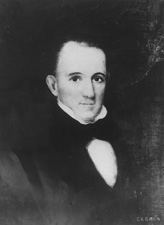Arthur P. Bagby
| Arthur Pendleton Bagby | |
|---|---|
 |
|
| 10th Governor of Alabama | |
|
In office November 30, 1837 – November 22, 1841 |
|
| Preceded by | Hugh McVay |
| Succeeded by | Benjamin Fitzpatrick |
| Member of the Alabama House of Representatives | |
|
In office 1821–1822 1824 1834–1836 |
|
| Member of the Alabama Senate | |
|
In office 1825 |
|
|
United States Senator from Alabama |
|
|
In office November 24, 1841 – June 16, 1848 |
|
| Preceded by | Clement Comer Clay |
| Succeeded by | William R. King |
| Personal details | |
| Born | 1794 Louisa County, Virginia |
| Died | September 21, 1858 (aged 63–64) Mobile, Alabama |
| Political party | Democratic |
Arthur Pendleton Bagby (1794 – September 21, 1858) was the tenth Governor of the U.S. state of Alabama from 1837 to 1841. Born in Louisa County, Virginia in 1794, he studied law and was admitted to the bar in 1819, practicing in Claiborne, Alabama. He was a member of the Alabama State House of Representatives in 1821, 1822, 1824, and 1834–1836, serving as the youngest-ever speaker in 1822 and 1836, and he served in the Alabama State Senate in 1825. He served in the U.S. Senate from November 21, 1841, when he was elected to fill the vacancy caused by Clement C. Clay's resignation, to June 16, 1848, when he resigned to become Minister to Russia from 1848 to 1849.
During his time in the Senate, he was chairman of the Committee on Territories, the Committee on Claims, and the Committee on Indian Affairs. As a Senator, he supported the annexation of Texas. Bagby died in 1858 in Mobile, Alabama, and he is interred in Magnolia Cemetery there.
During Bagby's administration, the country was plagued by economic depression as a result of the Panic of 1837. Bagby introduced measures to assist the state banks but the state legislature rejected most measures. All the state banks were closed by Bagby's successor, Governor Benjamin Fitzpatrick.
...
Wikipedia
